Many businesses can benefit from Geoapify Address Lookup and Validation APIs. Restaurants who offer a delivery service, lawyers, service providers such as repair companies, and any other business that sends people, documents or purchased items to their customers.
As well as finding locations and creating routes, API address lookup data can be used to analyze locations. This is helpful in geotargeting and geomarketing.
Geoapify solutions for address lookup and validation can be split into:
- Location search by address
- Address search by coordinates
- Address verification
- Address standardization
Let’s take a look at the most common address search tasks businesses need help with, and how Geoapify can solve them.
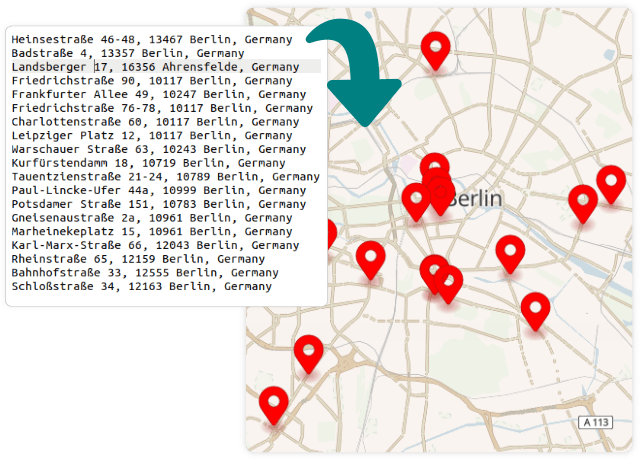
Address Lookup or Geocoding API
You already have the address, but you need the corresponding location. This operation is called Geocoding.
For example, you need to know the geographical coordinates of your customers. You can use our address search API to display the corresponding addresses on a map, so you can plan a delivery route, or estimate the distance between locations.
How it works: you enter "176 East 3rd Street, London, KY 40741, United States of America" and the API returns the coordinates => "37.128221 -84.081854"
Geoapify’s Geocoding API accepts a whole address or its components such as postcode, city, street, or house number. You can set your own parameters such as limiting results to specific countries or a set radius, or by prioritizing certain locations.
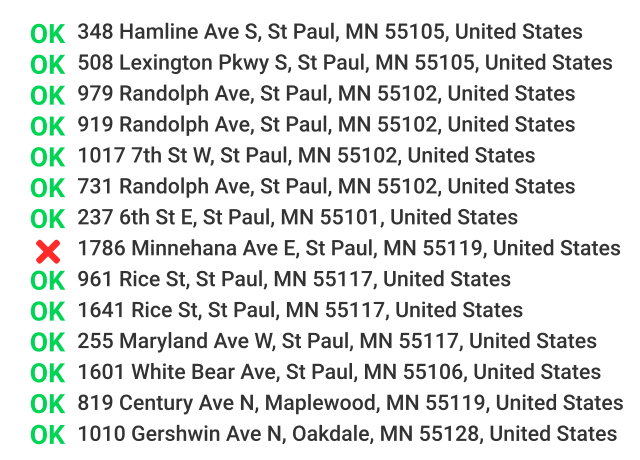
Address Validation and Verification API
Address Validation/Address Verification API let you know whether the provided address exists, and is a valid address.
This can save your business valuable time and money that might be lost due to using an incorrect address. For example, if the address is incorrect your delivery drivers might get lost looking for it. Being able to verify addresses also helps businesses avoid payment fraud scams, or errors in entered shipping addresses.
Did you know that as many as 3% of the most legitimate looking addresses are actually rerouting fraud? Address verification API can help you spot and avoid this.
Geoapify Geocoding provides confidence coefficients for the address in general, at the street level (confirming if the street is valid and verified), and at the city level (confirming if the city is valid and verified.)
How it works: if you search for "2382 Mapler St, Seaford, NY 11783, USA", the API will tell you that the address is not verified because there is no such street address, although the city and zip code were found.
Try our Bulk Address Validation/Verification Tool to test how our platform works.
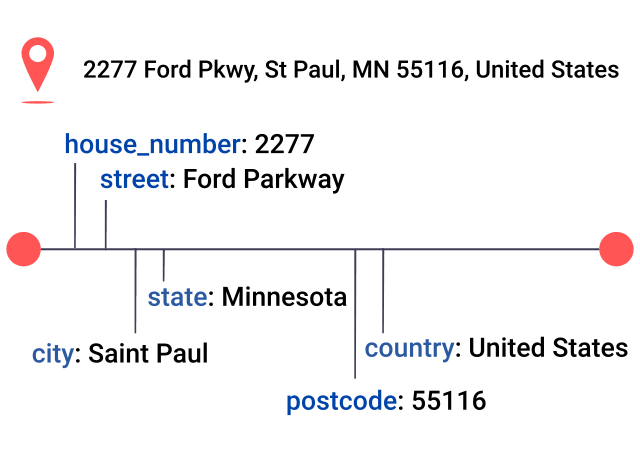
Address Standardization (Normalization) API
There are many different ways to write an address. Different countries have different standards, and there are often different localized names. Even one street can be written in many ways, such as the full name or abbreviation.
Take the Italian Street “Via XX Settermbre” as an example. It can also be written as “via 20 Settembre” or “Via Venti Settembre”, and all of these spelling are correct.
If you work with international addresses, you’ll find that different countries have different address standards. Like this:
- Henri-Dunant-Straße 74, 45131 Essen, Germany
- 440 Barrows Lane, Birmingham, B26 1QL, United Kingdom
- Rua Teodoro da Silva 726, Vila Isabel, Rio de Janeiro - RJ, 20560-000, Brazil
Address Standardization API (which is also called Address Normalization) makes sure you record addresses correctly, and helps you convert them into the correct format for different mail carriers. This cuts down on incomplete or invalid information, and also reduces duplicate data.
With Geoapify Geocoding you can standardize the address format. Address Standardization API provides address components such as postcode, city, country, street and house number as separate fields, so you can format each address according to your needs.
Try our Bulk Address Standardization Tool to test how our platform works.
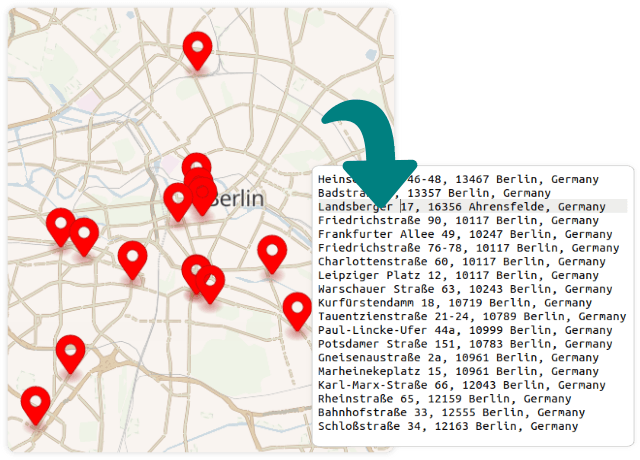
Reverse Address Lookup or Reverse Geocoding API
Reverse Address lookup API, also called Reverse Geocoding, is the opposite of geocoding. Instead of entering an address to get its coordinates, you enter the coordinates to find the corresponding address.
This is useful when you need to identify a customer’s location by their latitude/longitude, or a user clicked on a map and you need to know where they clicked.
How it works: You enter the coordinates "34.433304, -119.667754" and the API returns the address "1875 Eucalyptus Hill Road, Santa Barbara, CA 93108, United States of America"
With Geoapify Reverse Geocoding you can get addresses to match geographical coordinates. You can also specify the address level you want to work with (state, city, postcode or street.) If the coordinates are outside a building, the API will return the nearest building address.
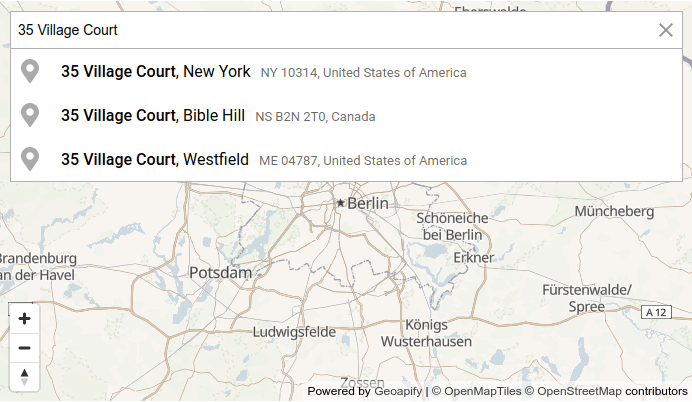
Address Autocomplete
If your business has an input form to collect addresses, Autocomplete API provides suggestions for the part of the address that the user enters. This is helpful when customers are placing an order at an online store, for food delivery, or when registering for an event or requesting information in the mail.
At first glance, address autocomplete looks similar to geocoding. However, they have significantly different goals. Autocomplete aims to guess the full address from the part the user enters, and return a result as quickly as possible. Autocomplete assumes that the user will review its suggestions and choose the correct one. Geocoding on the other hand accepts the complete address as an input, and tries to find the best fit.
How it works: a user enters "35 Village Court" and gets:
- 35 Village Court, Bible Hill, NS B2N 2T0, Canada
- 35 Village Court, New York, NY 10314, United States of America
- 35 Village Court, Westfield, ME 04787, United States of America
They can then choose the correct one.
Geoapify offers an Address Autocomplete API and ready-to-use components based on it. Our API returns separate address components like house number, street, postcode (or zipcode), city, state, country, and latitude/longitude coordinates. You can create autocomplete inputs based on postcode, city, and country. You can also filter and prioritize your results by countries or boundaries.
Address Lookup and Verification API tutorials
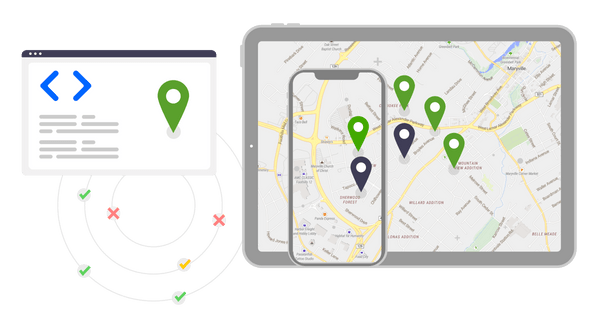
6 Way To Do Address Validation and Address Verification
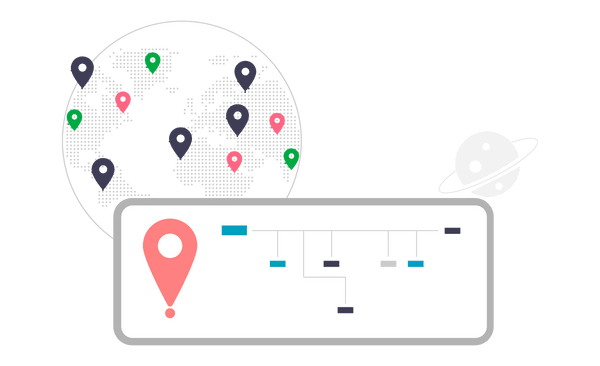
How To Parse Postal Addresses With API, Regex, NMP or Libpostal
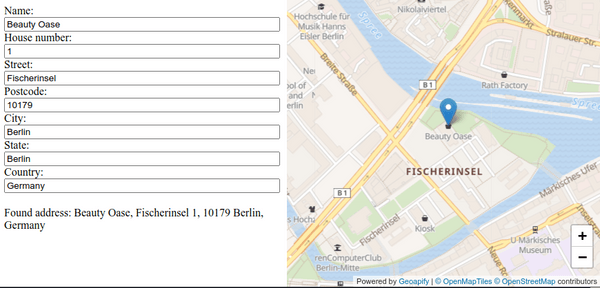
Javascript Tutorial: How to get address by coordinates with Reverse Geocoding API
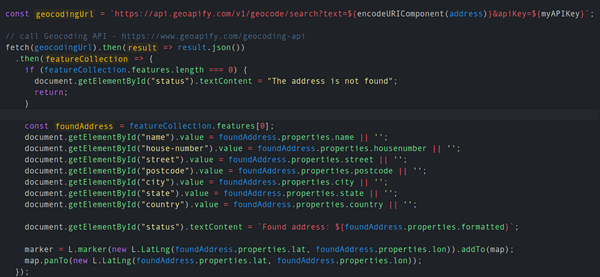
Javascript Tutorial: How to search addresses with Geocoding API
Geoapify Address Lookup and Validation API Pricing
Geoapify's Address Lookup and Validation API offers flexible solutions for various use cases, making it challenging to estimate costs directly. To simplify this, we use a credit-based system:
- Forward Geocoding: 1 credit is used for each address query to convert an address into geographic coordinates.
- Reverse Geocoding: 1 credit is used for each request to convert coordinates back into a readable address.
- Autocomplete Service: 1 credit is used for every suggestion generated during address input.
- Address Validation: 1 credit is used for each validation request to verify address accuracy and completeness.
To get a rough estimate of your costs, use our Credits Calculator. To explore different pricing plans and available credit packages, visit our Pricing Page.
Conclusion
Geoapify offers a wide range of Address Lookup APIs and services. We offer competitive pricing and significant discounts on big volumes, making it easy and affordable to get started.
Try out our API on our Address Lookup Playground today. Want to process the data quickly and easily? Get in touch with us so our experts can process the data for you and return the results you need to save your business time and money.
FAQ
What is Geocoding API?
It's an application programming interface that allows getting location coordinates, structured/formatted address, and additional location information by free-form address string programmatically.
What is Reverse Geocoding API?
It's an application programming interface that returns structured and formatted addresses and additional location information by latitude/longitude coordinates.
What is Geomarketing?
Geomarketing means using localized data to refine business strategy and marketing. For example, you could collect shipping addresses and create heatmaps to analyze where most of your customers come from. Or you might track the success of a marketing campaign in specific areas to see where it’s bringing about the most new business.
How can I validate and verify addresses?
An address can be validated and verified with Geocoding API. The Geoapify Geocoding API returns parsed address, corresponding address, and confidence level, which lets to make statements regarding address validity.
What is the difference between Geocoding API and Reverse Geocoding API?
The Geocoding API and Reverse Geocoding API are called forward and reverse geocoding. Originally, forward geocoding converts address to location, and the reverse - location to address. Of course, both APIs return extended results containing structured addresses, location coordinates, and other useful data for convenience.
What is the difference between Geocoding API and Address Autocomplete API?
Both APIs search locations by addresses. However, the main difference is that the Geocoding API accepts an address string that contains the complete address and searches the address by the given string and the Autocomplete API assumes that the input string contains only a part of the address and makes smart suggestions on possible addresses.
What is a standardized address?
A standardized address is an address that follows a recognized format, typically conforming to postal regulations of a specific country or international standard. It ensures consistency, improves deliverability, and simplifies data management.
Is there a free address validation API?
Yes, Geoapify offers a free tier for its Address Validation API with a limited number of credits per month, allowing you to validate addresses at no cost within the free quota.
How to validate a list of addresses?
You can validate a list of addresses by using the Geoapify Geocoding API in batch mode. Upload your address list, and the API will process each entry, returning validated addresses with corresponding data.
